My diary
Day 23 - 21 May 14
We catch the bus to Pangdabai from where we take a fast boat to Gili Trawangdan. On our arrival, white sands and crystal clear turquoise waters greet us, along with a gaggle of bronzed, early 20 years olds, waiting to depart. It's a popular destination with lots of guesthouses covering the small island and huts with cafes and sun loungers stretching along the beach, but it has still managed to preserve some of its paradise charm. Another small island faces us across the water. Motor vehicles are prohibited on the island. People cycle or walk, or use the available horses and carts. We lug our bags around in the hot sun to locate a guesthouse. We find a place close to the beach with clean linen and outdoor porches in a small leafy courtyard. The manager is very helpful, but also attempts to charm us with his unsubtle hints, suggesting he's looking for an English wife and
Gilli Trawangan - white beaches and turquoise waters
Lombok, Indonesia
Day 23 - 21 May 14
We catch the bus to Pangdabai from where we take a fast boat to Gili Trawangdan. On our arrival, white sands and crystal clear turquoise waters greet us, along with a gaggle of bronzed, early 20 years olds, waiting to depart. It's a popular destination with lots of guesthouses covering the small island and huts with cafes and sun loungers stretching along the beach, but it has still managed to preserve some of its paradise charm. Another small island faces us across the water. Motor vehicles are prohibited on the island. People cycle or walk, or use the available horses and carts. We lug our bags around in the hot sun to locate a guesthouse. We find a place close to the beach with clean linen and outdoor porches in a small leafy courtyard. The manager is very helpful, but also attempts to charm us with his unsubtle hints, suggesting he's looking for an English wife and
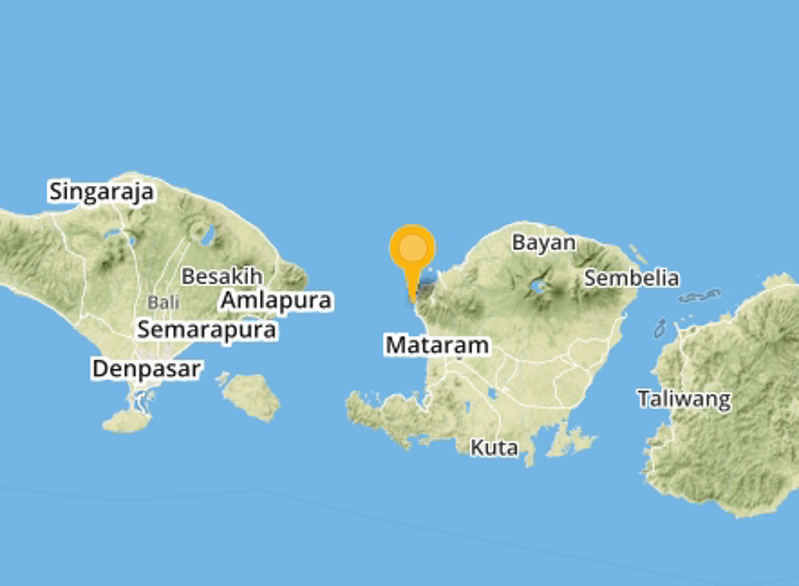
asking if I am a lucky girl - 'maybe I can be your lucky man', but he is harmless and it is clearly in jest (we hope).
In the afternoon, dark clouds appear. We sit on sun loungers next to the lapping waves reading with an iced coffee. We feel a few drops of rain and half a rainbow shines to our right with the backdrop of the mountains of Lombok behind. The clouds soon pass by to be replaced with blue sky in the late afternoon sun.
There is a large courtyard just off the beach set up with food stalls. It's cheap and the BBQ smell attracts us. For dinner, I choose fish with rice. It is a relatively small fish, which has been fried on the fire until the skin has become crunchy so the fish is almost completely dried out. It's impossible to eat with the plastic fork and spoon provided - I manage as best I can to eat the edible morsels of fish using my hands. It is tasty, but not really worth the hassle.
We enjoy a glass of wine in a quiet bar before heading apprehensively to the 'Irish bar'. We've already been informed by a 20 year old that we met in Java that we are too old for Gili T. In retrospect she’s probably right, but we’re determined to embrace the cheesiness. We chat and reminisce about university days and soon become aware that our conversation has been influenced by the music that is playing – tunes from our first years in the cheesy clubs of Bristol. We join the dancing and later sit on the tables, people watching.
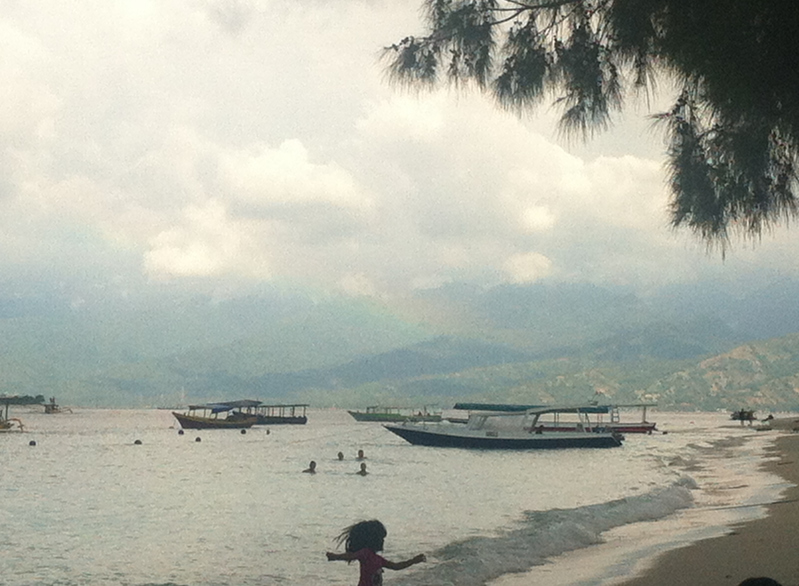
Interestingly, the Indonesian men integrate with the Western men - it's nice to watch these blossoming friendships. A couple of young guys approach us - the guy I'm chatting to is an easy conversationalist, but after Hannah has been asked a series of boring questions such as: 'so you've been travelling for a year - where next?' and 'how long is your hair when it's down?', we excuse ourselves. At the bar, I am accosted by an Indonesian, who was born on the island – he is friendly but our conversation soon dries up due to the language barrier, so I turn away to join Hannah and a Kiwi guy she is chatting to instead. We leave the party at 4 am, while it continues into the early hours.
Day 24 - 22 May 14
We spend the day on the beach in a relaxed bar playing reggae. The picnic furniture and bamboo huts are painted white. We sink down under the shade into bed shaped structures, complete with cushions and mattresses and order pizza. As we are eating, a baby goat jumps up onto the table and attempts to nibble our food. He's clearly the star attraction of the place - guests feed him leaves and people turn up later to visit him. His name is Choco. He's only 1 month old, and tame enough to be petted. The day is easily spent lounging in the sun, sleeping in the shade and swimming. Cafe Easy's slogan is 'easy come hard to go'. We agree and as we are leaving at
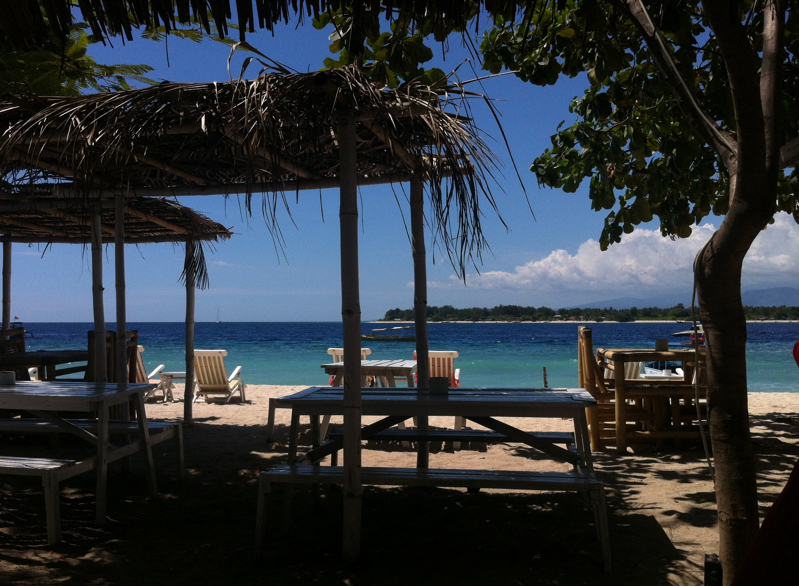
sunset, we tell the friendly bar staff that we will probably be back the following day.
In the evening we return to the food court for dinner and eat a selection of delicious vegetable dishes with rice. A man called Alex joins us at the table. He's from East Timor. His English is good enough to enable an interesting conversation. He's a surf instructor in Kuta in Bali but his family still lives in East Timor. He tells us he misses his mother, but otherwise he's happy in Bali. Most of his siblings now have families. He is not close to his father, who makes his money from gambling.
We ask him about the bribery we saw on the bus to Bali - apparently since the Bali bombings Indonesians need a special identification card to live in or visit Bali, so that the government can track everyone's whereabouts for a higher level of control over terrorist attacks. He dislikes the current president in Indonesia - too many promises were made that weren't fulfilled and the tax on food and fuel is way too high.
He also reminds us how lucky we are in England to have free health services - that we will get treatment for illnesses such as cancer, which few people would ever be able to afford in Indonesia. He explains that a card exists for the poorest Indonesian inhabitants whereby if they are ill the government will pay for their health care, as was the case for his sister who fell ill recently. As we leave we agree that if we do come to Kuta we will try to find him for a surfing lesson.
Day 25 - 23 May 14
We hire bicycles to cycle around the island. It’s only 8.30 am but it’s already getting hot. The island is tiny. In places, the path is covered by a thick layer of sand. We have neither the balance nor strength to cycle over this terrain so we get off the bikes and push, remembering the ice cream men cycling their carts along the beaches in India now in slight awe. There are some beautiful hotels within large grassy, palm tree covered expanses and the surrounding sea is as clear as a swimming pool.
Nearing the end of our circuit we come to a deserted, old bungalow resort on the seafront. The huts sit along old garden paths - they are solid buildings with tiled roofs, little green-tiled porches and with blue painted doors. They are bolted but not locked - the beds, mattresses and side tables have not been removed. Sand and dust covers the floor and cobwebs drape across the entrances. There is no running water from the taps in the bathrooms, but it looks like squatters inhabit one of the rooms nonetheless as the door is padlocked and we can see clothes and a handbag hanging up through
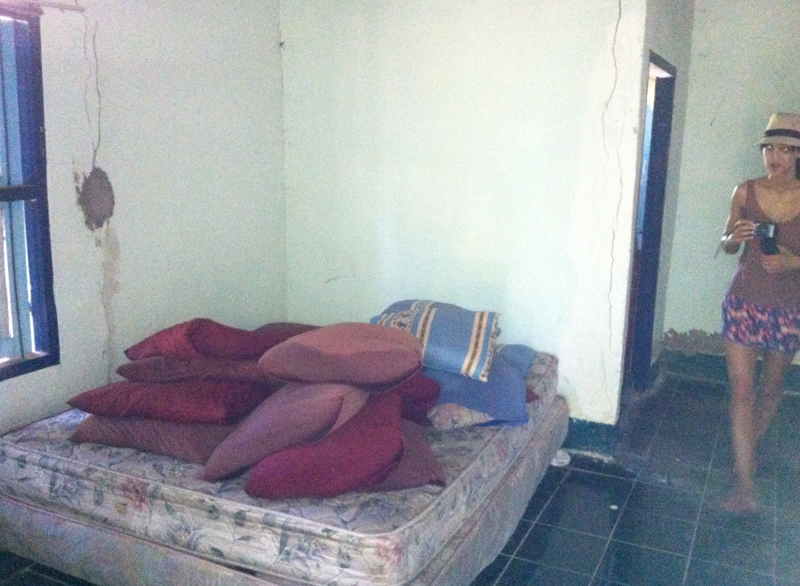
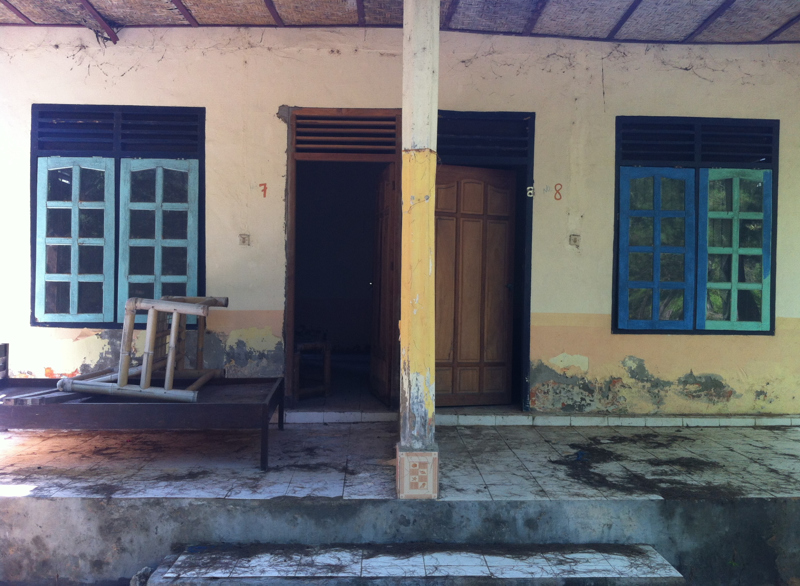
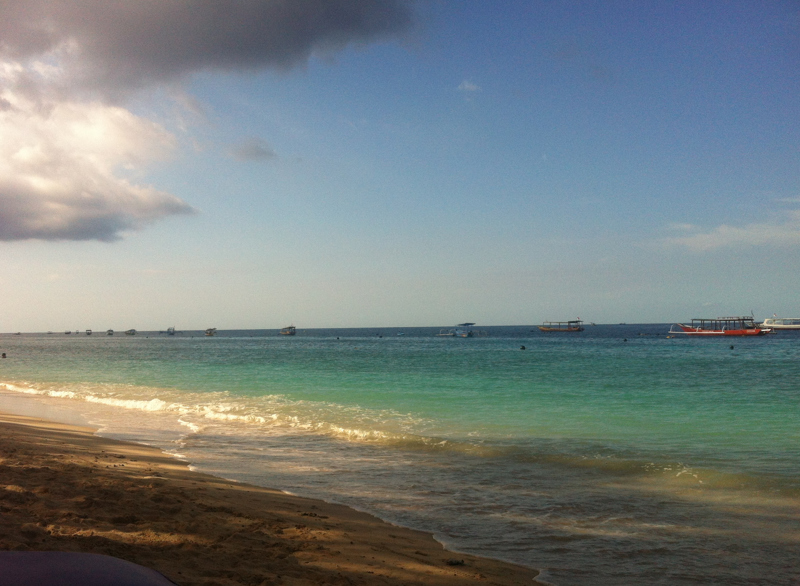
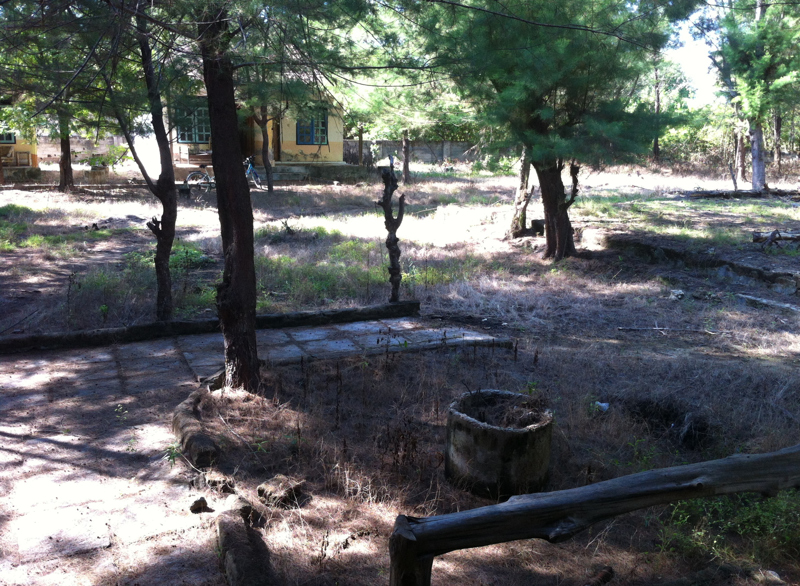
the dusty window. Remnants of colourful paint are visible on tree trunks. A small swimming pool or garden pond is now overgrown with dying brown shrubs. A local passes through and we ask him for its history. He tells us it was the first resort on the island, but when the owner became bankrupt, he was forced to abandon it. People have tried buying the plot from him since, but he's still waiting for a higher bid. It seems a shame that it has been left derelict unnecessarily for so long.
We return to cafe easy for swimming and sunbathing and in the evening we eat in the food court again. We have a drink at the bar Sama Sama, which means 'you're welcome' in Indonesian, and listen to the live reggae band. A rotund guy is drinking alone and he plucks up the courage to come and chat to us. He is originally from Venezuela but he has lived in Australia for 10 years. He is an engineer on an oil plant. The job sounds idyllic - 3 weeks working and 1 week for travel every month. Listening to him, we soon realise that it is in fact a pretty lonely existence and instead we inwardly sympathise with him. The Indonesian frontman is short and energetic, with wild hair. He clearly aspires to be Bob Marley, probably along with half of the island's male population.
Day 26 - 24 May 14
Today we've booked a boat tour around the archipelago. We're a little late turning up and I realise I've left the tickets back at the hostel. Hannah asks a girl if she knows where we can borrow a bike. She very sweetly lends us her bike and fetches her key. It rattles when I cycle and it is like a child's bike for my oversized body. I am feeling more and more like an Amazonian woman the longer I spend in Indonesia!
The boat trip stops in 3 different places around the Gili islands with lunch at Gili Air. We see a turtle from afar and a kaleidoscopic array of fishes. Shoals of tiny silver fish capture small specks of light like glitter. The snorkelling here is renowned for the existence of a rare blue coral. We see a few small patches of bright blue coral, but as I had been expecting an expanse stretching out like fields of cornflower, so I am a little disappointed.
At the food court in the evening, I inadvertently sit next to Norman who works at the hostel and is socialising with friends. When he sees my large pile of food, he tells me I will get fat. Norman has a wonderful high-pitched laugh, which makes me smile. He suggests I pack him in my bag or pocket for anytime I want to laugh whilst on my travels, but I tell him he is too heavy for me to carry. He saves half his fish for the cat that lives at the hostel - apparently it appeared at the hostel door one day when it was a tiny kitten and Norman has mothered it ever since. I don't mention that I’m impartial to cats and that I shut the door in his cat’s face when it was trying to enter our room the previous night.
There is a party at Sama Sama tonight. We sit at the bar for a drink and notice some familiar faces: the Venezuelan; an Indonesian from the previous party night; the guys that work at the hostel; some of the guests from our hostel; and the guy from Cafe Easy. We catch up with them all and enjoy some silly dancing. Later in the evening, chilling at the beach, we are chatting with Freddie, a French guy who works in construction in Australia and has been travelling on and off for 3 years. He has already told me earlier that his dad won millions from gaming, and he is using this to fund his travels. He tells us that he grew up in Haiti, and it now transpires that although his dad and he were in Paris when the earthquake shook their country, his whole family, including his mother, were all in Haiti and were some of the many victims who died. He relays this story in a matter of fact tone, expecting no pity, but there is a tear in his eye... and in mine. It is such a heartbreaking story, but he must know so many other families that experienced the same tragedy. It perhaps explains the hedonistic lifestyle that he appears to be leading - the perfect escapism.
Day 27 - 25 May 14
We pay to utilise a hotel's swimming pool on the island. The salt from the sea irritates my skin, so it is nice to be able to cool down in fresh, albeit chlorinated water. We're about to spend four days on a boat with no shower, so I want to make the most of this luxury. Another day of laziness spirals into an unsettling feeing of a lack of self worth. I am reading a book called Status Anxiety - Alain De Botton suggests we are all searching for a type of love and recognition from the multitudes and to do this we must achieve some form of higher status by proving our self worth through our employment, our achievements and the amount of money we earn. The combination of this book and a few days lethargically spent on the beaches like sloths has accentuated my feeling of guilt from being unemployed.
Day 28 - 31 26-29 May 14
The hostel staff are not up early enough for us to order breakfast. They seem to party every night so we assume they are nursing hangovers. We wake Norman to pay, who appears dishevelled and sleepy and we say goodbye. We are almost relieved to leave this partying pleasure island behind.
1.
Arrival in Jakarta, Pangandaran, Jogjakarta, Malang
2.
Volcanoes - Mt Semeru, Mt Bromo, Mt Ijen
3.
Ubud - a brief Sojourn
4.
Gilli Trawangan - white beaches and turquoise waters
5.
Boat Cruise - past the Komodo Dragons
6.
Flores - traditional villages and Mt Kelimutu
7.
Kuta, Lombok
8.
Baliem Valley - trekking in the mountains and meeting the Dani tribes
9.
Sentani - the festival and the lake
10.
Tana Toraja - Funerals and Burial Sites
11.
Kuala Lumpur - back in civilisation
12.
Cameron Highlands - trekking and tea plantations
13.
Georgetown, Penang - street art and crumbling mansions
14.
Banda Aceh and Pulau Weh - contending with Ramadan; Scuba Diving and snorkelling in paradise
15.
Lake Toba - the Batak people
16.
Bukit Lawang - Orangutans
17.
Unawatuna
18.
Volunteer Sri Lanka - Week 1
19.
Volunteer Sri Lanka Week 2
20.
Kandy and the East Coast
21.
Ella and Colombo
22.
Volunteer Sri Lanka - final week
23.
Earthbound Expedition - Kathmandu, Poon Hill and Chitwan National Park
24.
Back in Kathmandu
25.
Langtang - solo trekking
26.
Kathmandu to Varanasi